
March 25

1906 Adolf and Stefanie: It is around this time that 16-year-old Adolf Hitler becomes infatuated from afar with a girl in Linz named Stefanie, but never dares to speak with her. Instead, he attempts to communicate with her by telepathy, convincing himself that their love is so deep and obvious that verbal confirmation would be superfluous.
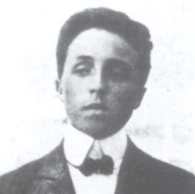
While large sections of the memoirs of August Kubizek (above) should be treated with a degree of suspicion, there is much that can be relied upon. For example, Franz Jetzinger was "deeply suspicious" concerning Kubizek's story of Adolf's long distance infatuation with Stefanie Jansten; but Jetzinger was surprised to discover that not only was Stefanie a real person, but that the time frame and other incidental details were borne out by his investigation. Jetzinger even interviewed Stefanie, who recalled receiving a strange letter from an unknown admirer declaring that he was about to enter the Vienna Academy of Art and would seek her out upon graduation. Having no recollection of the identity of the writer, she remembered the odd letter—and its fervent tone of adolescent romanticism—quite vividly. [For further details, Click here.]
1914 Armenian Massacres: Talaat Pasha's Official Orders:
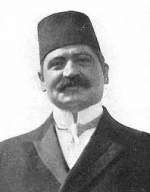
The duty of everyone is to effect on the broadest lines possible the realization of the noble project of wiping out of existence the well-known elements who for centuries have been the barrier to the empire's progress in civilization. We must, therefore, take upon ourselves the entire responsibility, pledging ourselves to this action no matter what happens, and always remembering how great is the sacrifice which the Government has made in entering the World War. We must work so that the means used may lead to the desired end.
In our dispatch dated February 18th, we announced that the Djemiet has decided to uproot and annihilate the different forces which for centuries have been a hindrance; for this purpose it is forced to resort to very bloody methods. Certainly the contemplation of these methods horrified us, but the Djemiet saw no other way of insuring the stability of its work.
Ali Riza [Note: the committee delegate at Aleppo] harshly criticised us and urged that we be merciful; such simplicity is nothing short of stupidity. We will find a place for all those who will not cooperate with us, a place that will wring their delicate heartstrings. Again let me remind you of the question of property left. This is very important. Watch its distribution with vigilance; always examine the accounts and the use made of the proceeds.
1918 Belarusian Peoples' Republic established:
Less than three weeks after the Treaty of Brest-Litovsk formally brought an end to Russia's participation in the First World War, the former Russian province of Belarus declares itself an independent, democratic republic on this day in 1918.
Modern-day Belarus‑-also known as Belorussia‑-was formerly part of Poland, its neighbor to the west, until a series of wars in the late 18th century ended with the partition of Poland and with Belarus in Russian hands. In 1917, Belarus capitalized on Russian weakness and disorder resulting from its participation in World War I and the Bolshevik Revolution of that year and proclaimed its independence, after more than a century of occupation by the czarist empire. At the time, Belarus was occupied by the German army, according to the terms formalized at Brest-Litovsk on March 3.
On March 25, a Rada (or council) pronounced the creation of the Belarussian People's Republic. Eight months later, however, with the defeat of the Central Powers at the hands of the Allies in World War I, Brest-Litovsk was invalidated and the German army was forced to pull out of Belarus and the former Russian territories. This left the fledgling republic vulnerable to a new Russian invasion: that of the Bolshevik Red Guard, who entered the Belarussian capital city of Minsk on January 5, 1919, and crushed the republic's government.
With the Rada in exile, the Bolsheviks declared the establishment of the Belarussian Soviet Socialist Republic. Poland, determined to re-establish its historical dominance over the region, promptly invaded the new soviet state; the Treaty of Riga of 1921 gave Poland the western part of Belarus. The rest of it became a constituent of the new Union of Soviet Socialist Republics (USSR), founded by Vladimir Lenin and the Bolsheviks in 1922. After Germany invaded Poland in 1939, the USSR took the opportunity to annex the part it had lost in 1921. These borders were confirmed in a treaty signed by the USSR and Poland at the end of World War II.
The Soviet Union dissolved in 1991, and Belarus became one of the founding members of the Commonwealth of Independent States (CIS), an association of 12 former republics of the USSR formed to help regulate foreign affairs, as well as military and economic policy among the member states. On March 25, 1993, the anniversary of the proclamation of Belarusian independence was openly celebrated for the first time in Minsk and other cities in the republic. (History.com)
1933 Various:
Church and Reich: Cardinal Bertram writes a list of proposed instructions to the clergy. He has now joined the group of bishops who favor withdrawing the various prohibitions imposed on the Nazi party. (THP)
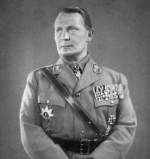
Holocaust: Hermann Goering publicly denies mistreatment of Jews and political opponents. Meanwhile, the Bavarian Ministry of Justice replaces Jewish judges in disciplinary and criminal cases.
USS Sequoia becomes presidential yacht:
President Herbert Hoover accepts the newly commissioned USS Sequoia as the official presidential yacht. For 44 years, the Sequoia served as an occasional venue for recreation and official gatherings for eight U.S. presidents. Before it was commissioned as the presidential yacht in 1933, the Department of Commerce used the Sequoia as a decoy to catch Prohibition law-breakers. President Hoover, though, used the Sequoia to indulge his favorite pastime: fishing. In 1936, Franklin D. Roosevelt chose to use the USS Potomac as his yacht rather than the Sequoia, but during World War II, he and then-Supreme Allied Commander Dwight Eisenhower secretly met on the Sequoia to discuss D-Day invasion plans. Harry Truman entertained visitors with his piano-playing and poker games and John F. Kennedy celebrated his last birthday on the Sequoia.
When not functioning as the presidential yacht, the USS Sequoia also served as the official vessel of the secretary of the Navy. President Jimmy Carter was the last to use the Sequoia before selling it to a private firm in 1977. President Reagan is said to have considered using the ship on occasion in the 1980s, but never did. The Sequoia has since undergone expensive restoration efforts. She is currently owned by the non-profit Sequoia Foundation and serves as a historic charter vessel on the Potomac River. (History.com)
1935 Bilateral talks March 25-26: held by Britain and Germany.
1936 Various:
Countdown to Infamy: The US, Britain and France sign the London Naval Convention.
Holocaust: Confiscation of property belonging to German and Jewish writers who voluntarily went into exile. (THP)
1937 Italy and Yugoslavia sign a non-aggression and neutrality pact.
1938 Hitler speaks in Koenigsberg:
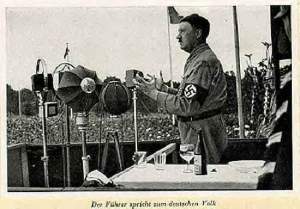
And then one day there came the hour when one had to make a decision before one's conscience, before one's own people, and before an eternal German God who had created the peoples. And a fortnight ago I made that decision, and it was the only possible decision. For when men are deaf to every behest of justice, then the individual most assert his rights himself. Then he must turn to that ancient creed: Help yourself and then the German God will help you. And the German God has helped us. [See: Was Adolf Hitler a Christian?]
1939 Various:
Slovakia—recently founded by Monsignor Tiso—is recognized by the Vatican:
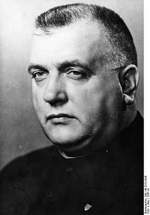
By 1938, with Europe on the brink of war, the Slovak National movement was strong, and the Slovak Populist Party, led by Father Jozef Tiso, was very powerful within the country. Meanwhile, political events in Europe, by the Allied powers desperate to avoid another war, had a huge impact on the 1st Czechoslovak Republic. Britain and France, met with the fascist Germany and Italy, to sign the infamous Munchen Treaty, which resulted in Czechoslovakia handing over the Northwestern area of Bohemia to Nazi Germany. This was then followed up by the fascist government of Hungary invading Southern Slovakia, in an attempt to claw back part of the Kingdom of Hungary they had lost in the Treaty of Versailles. The Hungarian Invasion resulted in Germany and Italy signing the Vienna Arbitration, which forced Slovakia to hand over 10,420 sq. km of their land, 779 villages and 859,000 inhabitants (276,280 ethnic Slovaks) to Hungary. In just over a month Czechoslovakia had lost over a third of its territory and 5 million inhabitants. The 1st Czechoslovak Republic was finally forced to split on March 14th, with Nazi Germany forming the Protectorate of Bohemia and Moravia, and the Slovak Republic. Dr. Jozef Tiso was made President of Slovakia, after a meeting with Hitler the previous day, where he was given an ultimatum to form an independent Slovak State.
Joseph Goebbels verbally attacks Great Britian:
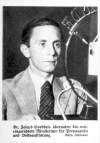
The English talk a lot about political morality. They have everything they need. They established a world empire at a time when politics was not all that concerned about morality. Now they are defending their empire with moral platitudes. They do not even think about stealing food, since they are not hungry. They have enough food whenever they want it. They can joke about our Four Year Plan, since they have at their disposal the enormous wealth of their empire. The boundaries of their national life can be very lax, not to say democratic, since they face no threat to their national existence. It is not so easy for us Germans. We have been a fully unified nation only for the last six years. We are still young and bear the scars of our former discords. We have to be cautious, sometimes even strict, lest the old wounds reopen.
1941 World War II: Various:
Yugoslavia joins the Axis:
Yugoslavia, despite an early declaration of neutrality, signs the Tripartite Pact, forming an alliance with Axis powers Germany, Italy, and Japan.
A unified nation of Yugoslavia, an uneasy federation of Serbs, Croats, and Slovenes, was a response to the collapse of the Ottoman and Hapsburg empires at the close of World War I, both of which had previously contained parts of what became Yugoslavia. A constitutional monarchy, Yugoslavia built friendships with France and Czechoslovakia during the years between the world wars. With the outbreak of World War II, and the Anschluss ("union") between Austria and Germany, pressure was placed on Yugoslavia to more closely ally itself [with] Germany, despite Yugoslavia's declared neutrality. But fear of an invasion like that suffered by France pushed Yugoslavia into signing a "Friendship Treaty"‑-something short of a formal political alliance‑-on December 11, 1940.
With the war spreading to the Balkans after the invasion of Greece by Italy, it was important to Hitler that the Axis powers have an ally in the region that would act as a bulwark against Allied encroachment on Axis territory. Meeting on February 14, 1941, Adolf Hitler proved unable to persuade Yugoslav Prime Minister Dragisa Cvetkovic to formally join the Axis. The next day, British Prime Minister Winston Churchill contacted the Yugoslav regent, Prince Paul, in an effort to encourage him to remain firm in resisting further German blandishments. It was essential to the Allies that Yugoslavia cooperate with Anglo-Greek forces in fending off an Axis conquest of Greece.
But with King Boris of Bulgaria caving into Germany, Prince Paul felt the heat of the Nazis, and on March 20 he asked the Yugoslav Cabinet for their cooperation in allowing the Germans access to Greece through Yugoslavia. The Cabinet balked, and four ministers resigned in protest at the suggestion. This gesture failed to prevent Prime Minister Cvetkovic from finally signing the Tripartite Pact in Vienna on March 25, 1941.
Within two days, the Cvetkovic government was overthrown by a unified front of peasants, the church, unions, and the military—an angry response to the alliance with Germany. Prince Paul was thrown from his throne in favor of his son, King Peter, only 17 years old. The new government, led by Air Force Gen. Dusan Simovic, immediately renounced the Tripartite Pact. In less than two weeks, Germany invaded the nation and occupied it by force. (History.com)
1942 Standard Oil: US Assistant Attorney General Thurman Arnold announces that William Stamps Farish has pled "no contest" to charges of criminal conspiracy with the Nazis. Arnold discloses that Standard Oil of New Jersey (later Exxon) of which Farish is president and CEO has agreed to stop hiding patents from the US for synthetic rubber, which the company has in its possession, and which are already in use by the Nazis at Auschwitz. (THP)
Church and Reich: Archbishop Groeber, in a pastoral letter abounding in anti-Semitic statements, blames the Jews for the death of Christ and adds that "the self-imposed curse of the Jews "His blood be upon us and upon our children," has come terribly true up until the present time, until today." (THP)
1943 Various:
Holocaust: France: The last of 4,000 Jews from the Marseilles area are transported to Sobibor. All but 15 are gassed and only 5 survive the war. (THP) [See: Was the Holocaust Detrimental to Hitler's War Effort?]
Poland: In Sterdyn, SS executes 47 Polish farmers and deports 140 to concentration camps for the crime of Judenherbergerung, or harboring Jews. (THP)
1944 World War II: Lancaster tail gunner Sergeant Nickolas Alkemade jumps from a blazing aircraft at 18,000 ft without a parachute and survives a landing in trees and deep snow.

1945 World War II: Various:
Churchill to Eden:
Further reflection convinces me we should send no answer to the insulting letter from Molotov. I presume you have already sent a copy of it to the State Department, pointing out, in no spirit of complaint, that it was they who particularly wished that the Russians should not come to Switzerland and that Alexander should deal with the matter on a purely military basis. I am sure the right thing now is to get absolutely in line with the United States, which should be easy, and meanwhile let Molotov and his master wait. I agree with you that the whole question of the San Francisco Conference hangs in the balance. The sending of Gromyko instead of Molotov is a grimace. I should suppose the President would be much offended by this. We have had a jolly day, having crossed the Rhine. Tomorrow we go to the 15th Scottish Division, on the other side. I should think it not at all unlikely that the whole German front in the West may collapse and be broken up into blobs. There is still hard fighting going on in the North, and the brunt again seems to come from the left-hand hinge, which, as usual, we form.

Wunderwaffen: The rocket-powered Kamikaze aircraft Ohka is used for the first time by Japanese forces against US naval forces. Note: 852 Yokosuka MXY7s, known as "Ohka flying bombs" and code-named Baka (fool), were built with rocket engines and short air-foils. These were launched at ships, and were virtually unsteerable.
[See: Wunderwaffen: Hitler's Deception and the History of Rocketry.]1946 Various:
Nuremberg Tribunal: Testimony of Foreign Office State Secretary Ernst Bohle:
It certainly must be evident that the moment German troops occupied a foreign city and freed the Germans living abroad who had been interned, the latter would put themselves at the disposal of the German troops and help them in every respect as guides, interpreters, or the like. That is certainly the most logical thing in the world.
Nuremberg Tribunal: Testimony of German Auslands-Institut Honorary President Karl Strolin:
Karl Strolin: [Constantin von Neurath] came to the conviction, at the beginning of 1944, that the saving of Germany from complete destruction must not be wrecked because of Hitler. He considered the question of how to speak to Hitler once more and persuade him to end the war. He thought of Field Marshal Rommel and asked me to discuss the matters with him. Rommel was at that time very popular in Germany and abroad, and Von Neurath believed that due to the position he held, Rommel was the right person to replace Hitler, if necessary. In the beginning of March 1944, I went to Field Marshal Rommel and discussed the matter with him. Rommel was just as critical of the situation. I knew him from the first World War, so that I could speak to him frankly. He was also of the opinion that if the war could not be won on a military basis, unnecessary bloodshed and senseless destruction . . .
The President: Dr. Ludinghausen, we really do not want all this conversation between this witness and Rommel. We do not want it. We will not hear the conversation between this witness and Rommel.
Dr von Ludinghausen: Nor do I want the witness to discuss this matter.
The President: Why don't you stop him then? Why don't you stop him?
Dr von Ludinghausen: I did not want to hear it from the defendant himself, but from the person who was employed by the defendant to take these steps. That in my opinion has more weight than if the defendant makes the statement himself. That is why I asked the witness about it. But it is almost finished now.
The President: When we come to the defendant then we will not hear him on these subjects. [See: Are There Any Lasting Effects From the Nuremberg Trials?]
Cold War: Soviets announce withdrawal from Iran:
In conclusion to an extremely tense situation of the early Cold War, the Soviet Union announces that its troops in Iran will be withdrawn within six weeks. The Iranian crisis was one of the first tests of power between the United States and the Soviet Union in the postwar world.
The Iranian crisis began during World War II. In 1942, Iran signed an agreement by which British and Soviet troops were allowed into the country in order to defend the oil-rich nation from possible German attack. American troops were also soon in Iran. The 1942 treaty stated that all foreign troops would withdraw within six months after the end of the war. In 1944, however, both Great Britain and the United States began to press the Iranian government for oil concessions and the Soviets thereupon demanded concessions of their own. By 1945, the oil situation was still unsettled, but the war was coming to an end and the American attitude toward the Soviet Union had changed dramatically.
The new administration of Harry S. Truman, which came to power when Franklin D. Roosevelt died in April 1945, decided that the Soviets were not to be trusted and were bent on expansion. Therefore, a policy of "toughness" was adopted toward the former wartime ally. Iran came to be a test case for this new policy. The Soviets had decided to take action in Iran. Fearing that the British and Americans were conspiring to deny Russia its proper sphere of influence in Iran, the Soviets came to the assistance of an Iranian rebel group in the northern regions of the country. In early 1946, the United States complained to the United Nations about the situation in Iran and accused the Soviets of interfering with a sovereign nation. When the March 2, 1946 deadline for the withdrawal of foreign troops from Iran passed and the Soviets were still in place, a crisis began to develop.
A major diplomatic confrontation was avoided when the Soviets announced on March 25, 1946, that they would be withdrawing their forces within six weeks. President Truman bragged that his threats of a possible military confrontation had been the deciding factor, but that seems unlikely. The Soviet Union and Iran had reached an agreement that gave the Soviets an oil concession in Iran. With this promise in hand, the Soviets kept their part of the bargain and moved their troops out of Iran in April 1946. Almost immediately, the Iranian government reneged on the oil deal and, with U.S. aid and advice, crushed the revolt in northern Iran. The Soviets were furious, but refrained from reintroducing their armed forces into Iran for fear of creating an escalating conflict with the United States and Great Britain. The Iranian crisis, and the suspicion and anger it created between the United States and the Soviet Union, helped set the tone for the developing Cold War. (History.com)
1949 USSR: The Soviet Union begins mass deportations of more than 90,000 people from the Baltic states to Siberia. [For further information, click here.]
1955 Spandau Prison: From Spandau: The Secret Diaries, by Albert Speer:
My relations with Doenitz continue to deteriorate. For his part, Doenitz has recently been trying to work things out with Raeder—the two of them, the one-time supreme commander of the navy and his successor, have managed to retain their former antagonism right up to the present time within these walls. On the other hand, Raeder's hate complex toward Hess, so fierce it is almost grotesque, is outlasting all changes of time and place. (Speer II)
1957 Common Market founded:
France, West Germany, Italy, the Netherlands, Belgium, and Luxembourg sign a treaty in Rome establishing the European Economic Community (EEC), also known as the Common Market. The EEC, which came into operation in January 1958, was a major step in Europe's movement toward economic and political union.
By 1950, it was apparent that centuries of Western European world supremacy was at an end. The national markets of Europe, isolated from each other by archaic trade laws, were no match for the giant market enjoyed by the United States. And looming over Europe from the east was the Soviet Union, whose communist leaders commanded vast territory and economic resources under a single system. Many European leaders also feared the resumption of conflict between traditional European antagonists such as France and Germany, which would only diminish the European economies further.
On March 25, 1957, representatives of six European nations signed two treaties in Rome. One created the European Atomic Energy Community (Euratom) for the common and peaceful development of Europe's nuclear resources. The other created the EEC. In the Common Market, trade barriers between member nations were gradually eliminated, and common policies regarding transportation, agriculture, and economic relations with nonmember countries were implemented. Eventually, labor and capital were permitted to move freely within the boundaries of the community. The EEC, the ECSC, and Euratom were served by a single council of ministers, representative assembly, and court of justice. In 1967, the three organizations were fully merged as the European Community (EC). (History.com)
Edited by Levi Bookin (Copy editor)
levi.bookin@gmail.com
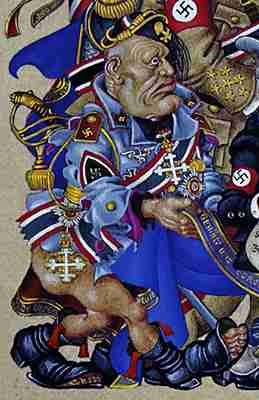
Disclaimer: This site includes diverse and controversial materials--such as excerpts from the writings of racists and anti-Semites--so that its readers can learn the nature and extent of hate and anti-Semitic discourse. It is our sincere belief that only the informed citizen can prevail over the ignorance of Racialist "thought." Far from approving these writings, this site condemns racism in all of its forms and manifestations.
Fair Use Notice: This site may contain copyrighted material the use of which has not always been specifically authorized by the copyright owner. We are making such material available in our efforts to advance understanding of historical, political, human rights, economic, democracy, scientific, environmental, and social justice issues, etc. We believe this constitutes a "fair use" of any such copyrighted material as provided for in section 107 of the US Copyright Law. In accordance with Title 17 U.S.C. Section 107, the material on this site is distributed without profit to those who have expressed a prior interest in receiving the included information for research and educational purposes. If you wish to use copyrighted material from this site for purposes of your own that go beyond 'fair use', you must obtain permission from the copyright owner.
Please Note: The list-owner and the moderator of 3rdReichStudies are not responsible for, and do not necessarily approve of, the random ads placed on our pages by our web server. They are the unfortunate price one pays for a 'free' website.